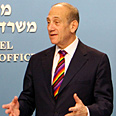
Olmert, who lately has been prone to severe criticism from the sides of politicians, senior public figures and a large section of the public, took advantage of the supportive mood of the evening to declare that he has no intention of giving up his position as prime minister – not in the near future, nor at the end of his four-year term.
“I will be prime minister for four years and even longer,” Olmert announced festively. “It is time people understand that governments cannot be changed up every Monday and Thursday.”
Olmert addressed political issues at hand saying, “There are hopes of speaking with Lebanon and even with the Palestinians. We must consider speaking with them because they are our neighbors.”
During the meeting Olmert discoursed to the council heads on the achievements of the war in Lebanon, and he reminded his audience that Wednesday he would present his proposal to the cabinet to establish various examining committees.
“We must quickly implement the committees’ conclusions because here in Israel there is no time, and you never know when the next war might break out,” he said. “Right now it is clear to every terror organization that it is dealing with a country that will go to war over two kidnapped soldiers. This message did not exist in the past, but now it exists.”
The council heads slammed State Comptroller Micha Lindenstrauss for advising Attorney General Mazuz to probe Olmert for suspicions he had appointed cronies to the posts in the Israel Small and Medium Enterprises Authority during his tenure as Industry, Trade and Labor Minister.
Some council heads even referred to Lindenstrauss’ conduct as ‘ugly.’
'Situation in Lebanon has changed forever'
Carmiel Mayor Adi Eldar said ‘Olmert is the prime minister, not just any politician, and he is tasked with rehabilitating the country and its army. With all due respect, we are talking about two or three employees who were appointed – but this does not mean the prime minister should be put on trial.”
The council heads asked Olmert to work toward strengthening Kadima throughout the country; the prime minister responded by saying that he is planning to boost the party and asked for their help in doing so.
Earlier on Monday Olmert met with a delegation of the American Jewish Committee in Jerusalem to discuss the war in Lebanon and its consequences. The war, Olmert explained to those present, caused the free world to wake up and comprehend the Iranian threat.
Lebanon, Syria and Iran, who have been preparing to wage war against Israel for years, to be launched whenever the time was convenient for Iran, did not foresee that Israel would attack upon the kidnap of two soldiers, Olmert said.
He added that he hoped the United States and the nations of the world would take the necessary steps to stop Iranian nuclear armament, which threatens “the world’s stability.”
During the meeting, Olmert explained that Israel decided to go to war as part of a strategic decision to change the equation in effect up until then, by which Israel absorbed and ignored violent provocations.
“Owing to this war, the situation in Lebanon has changed forever,” the prime minister said. “For the first time in 35 years, the Lebanese army is deployed along the border and Hizbullah is in hiding.”















